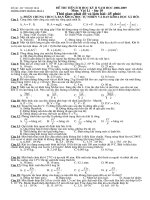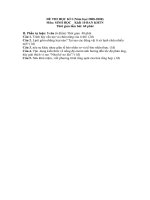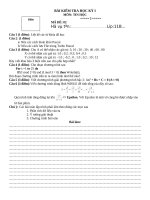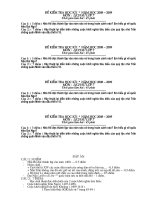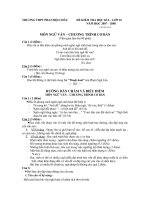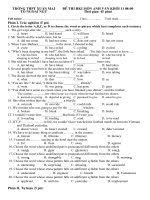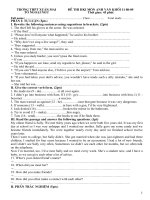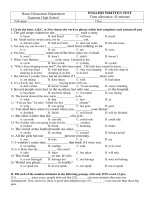DE THI HK 1
Bạn đang xem bản rút gọn của tài liệu. Xem và tải ngay bản đầy đủ của tài liệu tại đây (93.15 KB, 9 trang )
<span class='text_page_counter'>(1)</span>SAMPLE TEST 1 I. Choose the word which has the underlined part pronounced differently from the others: 1. A. works B. thinks C. helps D. weighs 2. A. changes B. believes C. arrives D. comes II. Choose one word which has different stress pattern from the other three: 3. A. pressure B. project C. confide D. active 4. A. mischievous B. confident C. comfortable D. supportive 5. A. believe B. secure C. discuss D. secret III. Choose the best option to complete each sentence: 6. He is the man ________ car was stolen last week. A. who B. whose C. that D. whom 7. Does your father ________ a hand with cleaning the house? A. work B. try C. give D. make 8. We often cook some ________dishes at Tet holidays. A. special B. specially C. speciality D. specialistic 9. I always try to help ________ household chores when I have free time. A. in B. with C. at D. of 10. She has been very ________ during my illness. A. supporting B. supportive C. support D. supported 11. All bottles ________ before transportation. A. is frozen B. froze C. freeze D. were frozen 12. The children _________ football when their mother came back home. A. played B. had played C. have played D. were playing 13. He asked me ________ the night before. A. where did I go B. that I had gone C. where I had gone D. whether I went 14. My father has to work _______ a night shift once a week. A. in B. on C. under D. at 15. He said that if it ________ that afternoon, they would go to the beach. A. hadn’t rained B. doesn’t rain C. didn’t rain D. won’t rain 16. People ________ don’t get enough sleep may become short-tempered. A. whom B. who C. whose D. which 17. I think that’s the hotel ________ John and Mary were married. A. when B. in that C. where D. which 18. Do you know the person ________ next to you in the evening class? A. who sit B. sits C. who sitting D. sitting 19. Each term _______ by a one-week break called half term. A. is separated B. separate C. are separated D. separates 20. Doctors are supposed to ________ responsibility for human life. A. take B. make C. get D. do 21. Whenever problems come up, we discuss them frankly and find solutions quickly. A. encounter B. arrive C. happen D. clean 22. As good children, they help their parents with _______. A. homework B. homemaker C. house warming D. household chores 23. We went by _______ train to the west of England. A. no article B. an C. a D. the 24. Mary ________ breakfast when the phone rang. A. is having B. was having C. had D. has had 25. The players all have ______ in their manager. A. confide B. confident C. confidently D. confidence.
<span class='text_page_counter'>(2)</span> 26. In America, it isn’t __________ to ask personal questions. A. polite B. impolite C. rude D. B& C are correct 27. She said that she _______back from the U.S.A three weeks before. A. was coming B. came C. had come D. has come 28. When I got home, I couldn’t believe my eyes to see that the house ________into. A. has been broken B. was broken C. is being broken D. had been broken 29. All children must complete the primary level of education, which is _________. A. optional B. compulsory C. allowed D. banned 30. He ________that she had been chosen to play in the national team. A. said her B. told C. talked to her D. told her IV. Choose the word or phrase is CLOSEST in meaning to the underlined word or phrase: 31. Do you think preparing for a job interview can cause mental stress? A. be stressful B. be stressed C. be stress D. be pressure 32. Can you tell me how to reduce the feeling of pressure before an interview? A. increase B. rise C. lessen D. raise 33. You should ask the job centre or employment agency all the information ---- to the interview. A. experience B. job C. vacancy D. candidate V. Choose the word or phrase is OPPOSITE in meaning to the underlined word or phrase: 34. Have you had any experience in job interviews? A. acquaintance B. inexperience C. inexperienced D. evidence 35. You should answer all the questions clearly, politely and honestly when the interviewer asks you. A. inhonestly B. imhonestly C. unhonestly D. dishonestly VI. Fill in each numbered blank with one suitable word or phrase: Jack is a nurse ---(36)--- looks after his two children by himself. He used to be a medical officer earning a substantial salary at one time. ---(37)---, when his wife passed away, he was forced to take full ---(38)--- for his children. As a medical officer, he was required to be away for months. As a single parent, he could no longer do this. He works as a nurse now and his working hours are more regular. His salary is less than it used to be. At lunch time, he has to go home to ---(39)--- sure that his younger daughter takes her lunch before going to school. He does all the household ---(40)--- from ironing to sewing buttons. What a blessing it is to him when his mother comes to stay with him. 36. A. whom B. that is C. whose D. who 37. A. However B. Despite C. Because D. Because of 38. A. responsibleB. responsibly C. responsibility D. irresponsible 39. A. do B. take C. get D. make 40. A. jobs B. works C. thing D. chores VII. Choose the correct sentence that has the same meaning as the given one: 41. He missed the train because he didn’t hurry. A. If he hurries, he will not miss the train. B. If he hurried, he would not miss the train. C. If he had hurried, he would not have missed the train. D. If he had hurried, he would not miss the train. 42. "I left my umbrella here two days ago." said Mary..
<span class='text_page_counter'>(3)</span> A. Mary said (that) she left her umbrella there two days before. B. Mary told (that) she had left her umbrella there two days before. C. Mary said (that) she had left her umbrella there two days before. D. Mary said to (that) she had left her umbrella there two days before. 43. I haven’t been to Bristol for three years. A. It is three years since I was last in Bristol. B. The last time I was in Bristol was for three years. C. The last time I was in Bristol was three years ago. D. Both A & C are correct. 44. My responsibility is to wash the dishes every day. A. I am responsibly for washing the dishes every day. B. I wash the dishes every day. C. I am responsible to wash the dishes every day. D. I am responsible for washing the dishes every day. 45. They sometimes allow me to go out with friends. A. I am sometimes allowed to go out with friends. B. They sometimes let me to go out with friends. C. Sometimes, they let me go out with friends. D. Both A & C are correct. VIII. Choose the most suitable response in each conversational exchange below: 46. A: “I’m sorry. I was stuck in a traffic jam.” - B: “________” A. It’s OK. We’ve just started. B. Never mind. Thanks. C. Don’t apologize. It’s all my fault. D. My pleasure. 47. A: “Will you do me a favor?” - B: “_________” A. What’s a favor? I don’t have any. B. Sure. What can I do for you? C. No, thanks away. I have enough favor. D. Ok, but I’m busy now. 48. A: “Do you mind if I sit here?” - B: “_________” A. No. Just go ahead. B. Yes, I guess so. C. Yes, please. D. No, thanks. 49. _ Peter: “ Do you feel like going to the cinema this evening?” _ Mary “------------” A. I don’t agree. I’m afraid. B. You’re welcome. C. That would be great. D. I feel very bored. IX. Choose the underlined word or phrase that needs correcting 50. The earthquake (A) would cause less (B) damage if the houses had (C) been of stronger (D) construction. 51. (A) By the time I (B) went to bed (C) last night, I (D) have done my homework. 52. Mike (A) told that he (B) was leaving (C) the next day, not (D) then. 53. Our students are (A) obedience and (B) hard-working but (C) they are mischievous (D) sometimes. 54. Dad is always (A) willing (B) to give a hand (C) in (D) cleaning the house. VIII. Read the passage and choose the correct answer for each Ü Parents often have dreams for their children’s future. They hope their children will lead a better life than they had. They dream that their children will do things that they couldn’t do. Parents who come to the U.S. from foreign countries hope their children will have better education here. They think their children will have more career choices and more successful lives. They make many sacrifices so that their children will have more opportunities. They think their children will remain close to them because of this. Some children understand and appreciate these sacrifices and remain close to their parents. However, other children feel ashamed that their parents are so different from other Americans..
<span class='text_page_counter'>(4)</span> 55. Parents often dream of ________. A. their children’s earning a lot of money in the future. B. the success of their children. C. living on their children’s money one day. D. a bright future for their children. 56. Parents who come to the U.S. from foreign country hope that _______. A. their children will have more careers B. their children become successful directors. C. their children will have more chances for good education. D. their children will make a lot of sacrifices. 57. Parents think their children will remain close to them because _________. A. they give their children a lot of money. B. of their sacrifices C. they know their children will be successful in the future. D. they are living in a foreign country. 58. The underlined word career in the passage is closest in meaning to ________. A. education B. travel C. subject D. profession 59. The underlined word close in the passage is closest in meaning to __________. A. dear B. friendly C. helpful D. kind Ü The Korean education system basically consists of primary schools, secondary schools, high schools, and colleges or universities, with graduate course leading to Ph.D. degrees. Primary education is compulsory for children aged six to eleven. The basic primary school curriculum is generally divided into eight subjects: the Korean language, social studies, science, mathematics, ethics, physical education, music and fine arts. Students in secondary schools are required to take a number of additional subjects, such as English, and can take electives, such as technical or vocational courses. Afterwards, students can choose between general education and vocational high schools. In general, high school tends to be strict, as college and university admission is very competitive. 60. Basically the Korean education system is divided into _________. A. two levels B. three levels C. four levels D. five levels 61. It can be inferred from the text that _________. A. primary education is compulsory for children under six. B. Children from six to eleven have to attend primary school. C. primary education is optional for children under eleven. D. All the above. 62. According to the passage, the basic primary school curriculum _________ A. consists of eight subjects. B. is the same as the secondary school curriculum. C. includes foreign languages. D. Both A and C. 63. It can be inferred that secondary school students ________. A. don’t have to study the Korean language. B. have to take at least nine subjects. C. have to take technical and vocational courses. D. can choose to take a technical course or not. 64. According to the passage,__________. A. most students go to vocational high schools after finishing secondary schools. B. Korean high school tends to be quite easy. C. it’s quite difficult to enter a college or university..
<span class='text_page_counter'>(5)</span> D. general education is easier than vocational high school.. SAMPLE TEST 2 I. Choose the word which has the underlined part pronounced differently from the others: 1. A. groom B. choose C. bamboo D. blood 2. A. discussed B. determined C. obliged D. shared 3. A. idea B. wiser C. confide D. attitude 4. A. maintains B. rejects C. precedes D. cultures II. Choose one word which has different stress pattern from the other three: 5. A. contractual B. cultural C. different D. sacrifice 6. A. marriage B. suppose C. certain D. equal 7. A. majority B. traditional C. comparison D. maintenance 8. A. reject B. feature C. attract D. believe III. Choose the best option to complete each sentence: 9. I live in a building _______ has 40 floors. A. which B. in which C. where D. it 10. When Henry arrived home after a hard day at work, ________. A. his wife was sleeping B. his wife has slept C. his wife slept D. his wife has been sleeping 11. If I _________ her address now, I ________ to her. A. know / wrote B. knew / would write C. had known / would have written D. know / will write 12. It _________ that they can pass the written exam this time. A. is hoped B. hoped C. hopes D. is hopes 13. Something strange __________ here last night. A. was happened B. happened C. happens D. is happened 14. “I can’t see the blackboard very well.” “Perhaps you need _________.” A. to examine your eyes B. to have your eyes examined C. to have examined your eyes D. to be examined your eyes 15. ___________, the football wasn’t cancelled. A. In spite of the heavy rain B. Although the heavy rain C. Despite it rained D. Though the rain 16. The woman _________ is my mother. A. that understand me best B. who understands me best C. whom understands me best D. whose understand me best 17. What’s more important to you? Intelligence or _________? A. attract B. attractive C. attractiveness D. attractively 18. A/An ________ is an official document stating that you have passed an examination, completed a course, or achieved some necessary qualifications. A. examination B. program C. certificate D. requirement 19. Since he ________ I have heard nothing from him. A. was left B. has left C. left D. had left 20. Jane asked me ________ the week before. A. where did I go B. where had I gone C. where I had gone D. where I went 21. That poster warns young people _________ the danger of drugs. A. in B. about C. for D. with 22. It’s very kind _______you to help me with the homework. A. to B. with C. of D. about.
<span class='text_page_counter'>(6)</span> 23. ________ smoking is considered harmful, the number of addicts is not decreasing. A. Because B. Because of C. In spite of D. Although 24. Many young people have objected to ____ marriage, which is decided by the parents of the bride and the groom. A. shared B. agreed C. contractual D. sacrificed 25. It is not easy to _________ our beauty when we get older and older. A. develop B. maintain C. gain D. collect 26. John cannot make a ____ to get married to Mary or stay single until he can afford a house and a car. A. decide B. decision C. decisive D. decisively 27. Have you been abroad recently? – “I last _______ abroad in 2004. A. go B. went C. was going D. have gone 28. When choosing a wife or a husband, the Americans are ___ with physical attractiveness. A. obliged B. concerned C. supposed D. concerning 29. Non-verbal ____ such as waving, nodding or shaking of the head also have cultural meanings. A. signs B. signals C. hints D. marks 30. Why don’t you make it bigger and more colourful in order to ____ people’s attention. A. keep B. hold C. attract D. raise 31. They wanted to know ______in the area. A. how long would you stay B. if you would stay how long C. how long you would stay D. how long will you stay 32. _ “Mr. John, please type those letters before noon” _ “ They’ve already _____, sir. They’re on the desk.” A. typed B. been being typed C. being typed D. been typed 33. There is somebody behind us. I think we are _______. A. being followed B. are followed C. follow D. following 34. It is -------that many people are homeless after the floods. A. was reported B. reports C. reported D. reporting 35. It’s a beautiful photo. I’m going to _______. A. get it enlarging B. have it enlarging C. have it enlarged D. set it enlarged 36. There ________ a big increase in the market for mobile phones recently. A. has had B. was C. has been D. is 37. John asked me ________I would help him if he needed help. A. unless B. that C. whether D. if only 38. I told them _________. A. to do not go there they B. not to go there C. not go there D. not going there 39. You have to ________this form first and then you send it to me later. A. bring up B. look up C. check in D. fill in 40. Body language is a potent form of ________communication. A. verbal B. non-verbal C. tongue D. oral 41. Laura said she had worked on the assignment since _______. A. yesterday B. two days ago C. the day before D. the next day 42. Once you’ve got your friend’s attention, a slight nod will do. A. be appropriate B. be kind C. have a bad effect D. get well IV. Choose the word or phrase is CLOSEST in meaning to the underlined word or phrase: 43. You should be on time or some minutes earlier for the interview..
<span class='text_page_counter'>(7)</span> A. in time. B. early C. punctual D. late 44. You should bring with you your school certificates and letters of recommendation from your teachers or your previous employers. A. employees B. employment C. bosses D. applicants V. Choose the word or phrase is OPPOSITE in meaning to the underlined word or phrase: 45. Which job do you prefer, an accountant or a doctor? A. love B. enjoy C. like D. hate 46. What qualification do you need if you want to become a teacher? A. qualified B. competence C. unqualification D. disqualification 47. Maybe he could be a teacher because he is very creative. A. clever B. gifted C. uncreative D. increative VI. Fill in each numbered blank with one suitable word or phrase: There are a lot of things you should follow to be a welcome guest in America. When you are (48)---- to have a dinner at your friend’s house, it’s necessary to bring a small present. Flowers are always nice; or you may bring a bottle of (49)---- if you know that your friend likes drinking. You are expected to arrive for dinner on time or just a few minutes late. Don’t get there early. If you are going to be more than fifteen minutes late, you should call and tell them. Try to relax and enjoy yourself at the dinner table. If you don’t know about choosing the -(50) ---- fork or knife, just watch the other people and follow them. If you still have no idea of (51)---- to do, ask the person next to you. When it comes to the food, if you like it, say so. They are looking forwards to hearing your compliments. Of course, you will thank them for the meal and for their kindness. It is also a good idea to send a (52)---- note the day after. 48. A. made B. invited C. demanded D. forced 49. A. lemonade B. Coke C. wine D. juice 50. A. big B. right C. main D. new 51. A. which B. where C. why D. what 52. A. thank-you B. goodbye C. welcome D. message VII. Choose the most suitable response in each conversational exchange below: 53. Peter: “I’m taking my GCSE examination tomorrow.” – Mary: “________” A. Good luck! B. Take care! C. That’s great. D. Congratulations! 54. – A: “I’m sorry. It’s late. I must go now. Bye bye.” –B: “_________” A. You’re welcome. B. Good bye. See you soon. C. Not at all. D. Hello. 55. – “I have bought you a toy. Happy birthday to you!” - “__________” A. The same to you! B. Have a nice day!.
<span class='text_page_counter'>(8)</span> C. What a pity! D. What a lovely toy! Thanks. 56. – “You look nice today. I like your new hairstyle.” - “________” A. It’s nice of you to say so. B. Shall I? Thanks. C. Oh, well done! D. I feel interesting to hear that. VIII. Choose the correct sentence that has the same meaning as the given one: 57. They think the owner of the house is abroad. A. It is thought that the owner of the house is abroad. B. The owner of the house is thought to be abroad. C. The owner of the house is thought to have been abroad. D. Both A&B are correct. 58. We are talking about the girl who used to be a Miss-World. A. The girl about whom we are talking used to be a Miss-World. B. The girl about who we are talking used to be a Miss-World. C. The girl we are talking about used to be a Miss-World. D. Both A&C are correct. 59. Everyday I spend 30 minutes watering the flowers. A. Every day it takes me 30 minutes to water the flowers. B. Every day it takes me 30 minutes water the flowers. C. Every day it takes me 30 minutes watering the flowers. D. All are correct. 60. “If I were you, I wouldn’t smoke.” A. She invited me not to smoke. B. She advised me not to smoke. C. She told me not to smoke. D. She accused me not to smoke. 61. I’m so busy that I don’t go out much these days. A. If I had not been busy, I would have gone out much these days. B. If I were not busy, I would go out much these days. C. If I am not busy, I will go out much these days. D. Unless I had been busy, I would not have gone out much these days. IX. Choose the underlined part that needs correcting: 62. (A) Although its height, Mount Whitney, (B) one of North America’s highest (C) mountains is (D) popular with hikers. 63. (A) After John had (B) finished his work, he (C) watches his (D) favourite television programme. 64. If she (A) had taken the doctor’s (B) advice, she (C) would have been (D) better now. 65. (A) A lot of discoveries (B) have made in the (C) fields of chemistry and (D) physics. X. Read the passage and choose the correct answer for each question: Ü In the United States and Canada, it is very important to look a person directly in the eyes when you are having a conversation with him or her. If you look down or to the side when the other person is talking, that person will think that you are not interested in what he or she is saying. This, of course, is not polite. If you look down or to the side when you are talking you may appear to be hiding something; that is, it might seem that you are not honest. However, people who are speaking will sometimes look away for a few seconds when they are thinking or trying to find the right word. But they always turn immediately back to look the listener directly in the eyes. These social “rules” are the same for two men, two women, a man and a woman or an adult and a child. 66. In the U.S. and Canada, when you are having a conversation with someone __________. A. do not look directly in the eyes. B. it is impolite to look at the eyes of the speaker or hearer. C. you should look him or her directly in the eyes. D. A &B. 67. If you look down or to the side when the other person is talking ____________..
<span class='text_page_counter'>(9)</span> A. you will be thought to be not interested in the conversation. B. you are very interested in what is being said. C. You are very polite. D. You are the interesting person. 68. If you look down or to the side when you are talking ___________. A. the Americans are interested in you. B. you are thought to be dishonest. C. you are very polite. D. you are interested in the conversation. 69. The speaker will sometimes look away _______. A. because he or she wants to end the conversation. B. because he or she thinks that the hearer is not honest. C. because the hearer is interested in what is being said. D. because they are thinking or finding the right word. 70. These social “rules’ are __________. A. for men only. B. for women only. C. for children only. D. the same for everybody. Ü The way we speak can tell others a lot about our backgrounds. We can guess if someone is from the northern part of our country or the southern. What happens if a child has a southern accent but uses northern words? We might guess that the child’s family moved from the north to the south. The child has the accent of his friends but uses some words only used by his parents. Our social background also affects the way we speak. A famous sociolinguist, William Labov, tried to find link between accent and social class, He went to three different shops in New York. The first was used by upper class people, the second by the middle class, and the third by the lower class. He found that in general, people in the upper class shop did not pronounce “R” in the same way as customers in the other shops. 71. The underlined word “the third” in the passage refer to ----. A. the accent B. the shop C. the social class D. sociolinguistic 72. What is the main idea of the passage? A. The relationship between the northern and southern accents. B. The relationship among ships in New York. C. The relationship between the way we speak and our background. D. The relationship among classes in New York. 73. According to the passage, what affects the way we speak? A. Our childhood B. Our social background C. Our customers D. Our pronunciation 74. The author discusses the link between accent and social class in order to ----. A. support the idea that our background influences the way we think. B. find a link between accent, childhood, New York, and social class. C. show how accent will change our background if we are not careful. D. explain the difference between middle class and upper class shops. 75. The word “class” in the passage is closest in meaning to A. a classroom B. a group of people C. a family D. a shop.
<span class='text_page_counter'>(10)</span>


